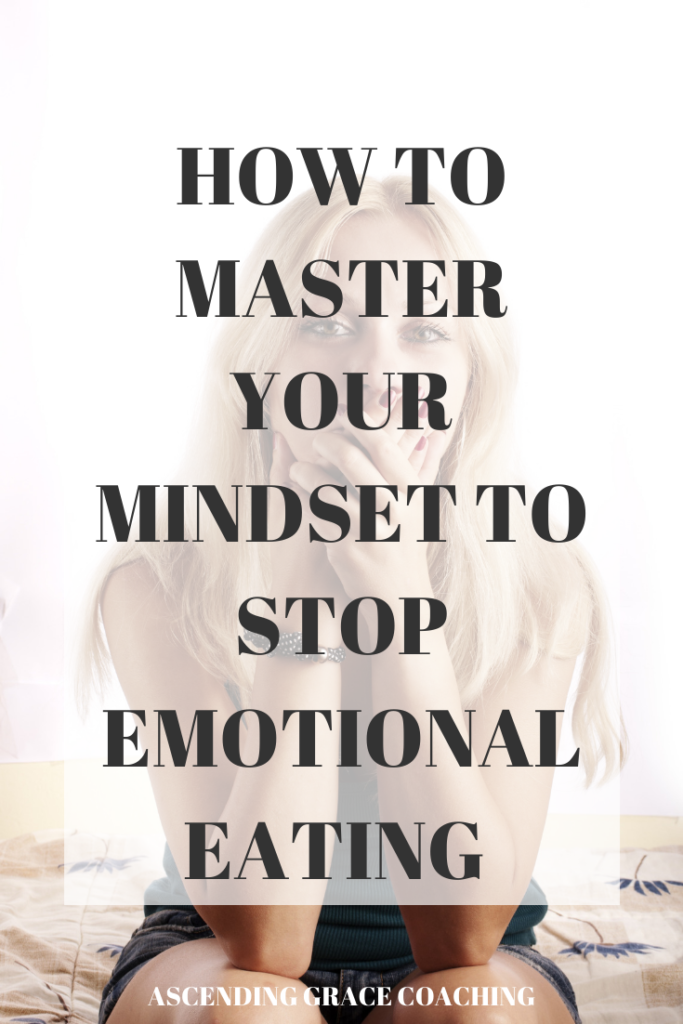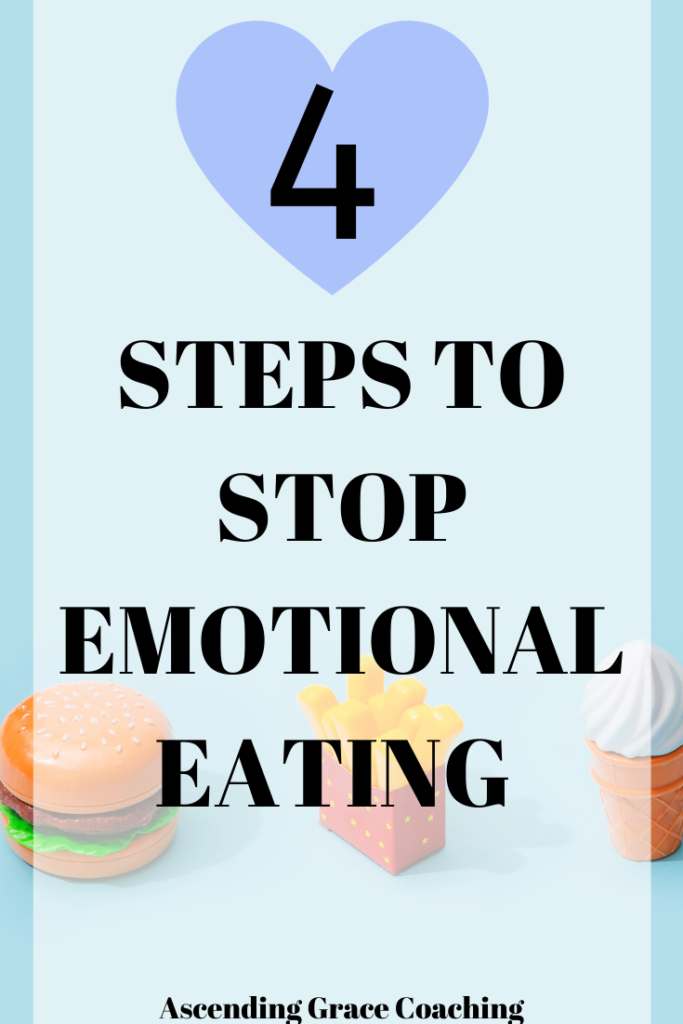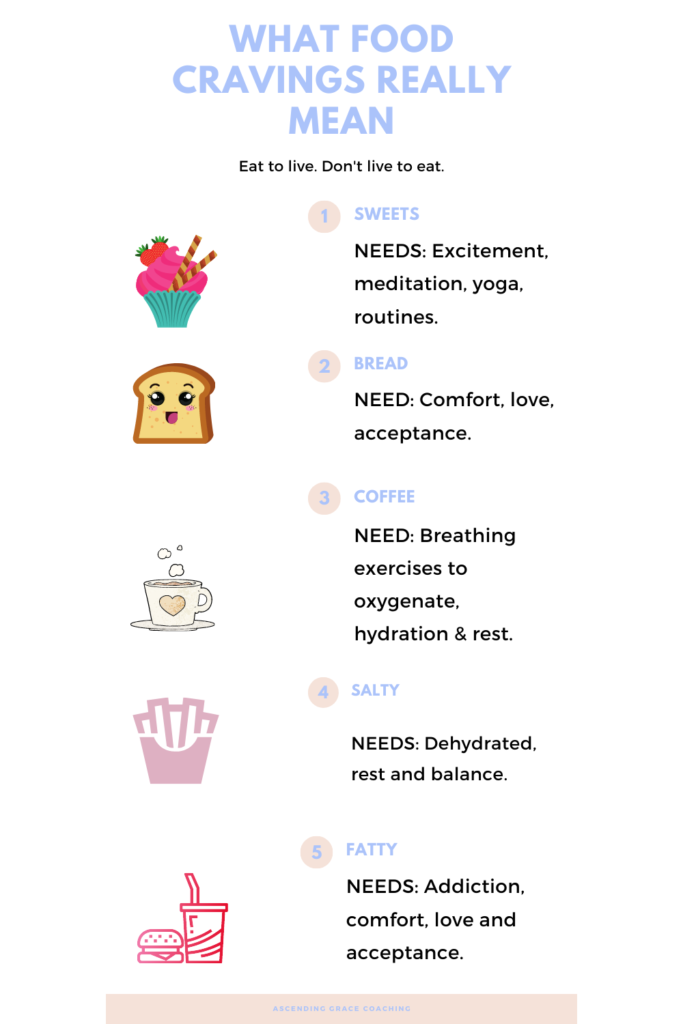
Emotional Eating- How to Identify and Overcome it.
Emotional eating becomes a problem when we eat in response to negative or positive emotions.
Any eating or restricting that is not natural is emotional eating.
Even if you are hardly eating and underweight you are still an emotional eater. Most people are eating in an emotional way, even if they aren’t truly eating.

Eat to live. Don’t live to eat.
Alexis- Health and Wellness Coach at Ascending Grace
What you are eating and how you are eating it are things to consider as well.
Keep in mind, it isn’t just the extremes of eating like anorexia or obesity that cause problems.
It’s the mentality you build around food and your response from and to eating that pose an issue.
Many of us have an emotional connection to eating that we aren’t even aware of.
If you have ever experienced any of the following you may have an unhealthy relationship with food:
- Feel more content or safe after grocery shopping
- Are constantly dieting
- Obsess over food choices or mistakes
- Fixate on how much you weigh
- Perfectionism
- Feel excited to eat a certain food.
- Eat to relieve stress or depression
- Snack a lot
- Eat when bored
- Eat as a reward or to celebrate
- Using food to connect with others
- Have ever been bullied about your appearance
Emotional eating is a mindset. Just like being addicted to drugs or alcohol you may be using food to fill a void or resist an emotion you don’t want to feel.

The best way to change an emotional eating mindset is to take the following 4 steps
1. Become Aware
I wrote an in depth article on how to become more self aware here!
Most of the time when you are emotionally eating you aren’t aware of it.
Begin to notice and accept that you are more than likely emotionally eating.
Identifying where you are emotionally eating aka eating outside of necessary nutritious meals. Quiz yourself and ask am I hungry? Am I feeling, emotional, excited, bored, sad, lonely, exhausted.
2. Break the emotional eating habit
Emotional eating is something you do to make yourself feel better. It is a tool you are using to comfort yourself.
Just like with any addiction you are using food to avoid dealing with a seemingly scarier truth than your emotional eating.
To overcome this habit, you must get to the root of what is triggering you to emotionally eat. This will be a process. I urge you to be gentle and patient with yourself.
Start with kicking one bad habit before you get rid of another and build from there.
This is called habit building and it’s the approach I use with my coaching clients. It’s far more sustainable than a crash diet approach.
3. Make a food plan
The best way to stop emotionally eating is to plan out healthy balanced meals in advance. Then, anything extra you can look at as possible emotional eating.
Its not until you know what the true issue is, that you can create a plan to overcome or avoid it.
Focus on what is causing the problem and not the symptom, which is overeating.
When you stop emotionally eating to avoid dealing with your emotions you go from two problems to having one problem.
4. Practice asking your body and mind what they need
It only takes 30 seconds to check in with yourself. Ask what do I need? Maybe it’s a break, a nap, or confronting something stressful. Maybe you just need a nutritious meal, a smoothie, or some water. If you have had a meal already, the answer is not food.
Try checking in with your intuition and asking what does my body need right now? Think about how regular your bowel movements have been or the color of your pee. Consider what emotions and thoughts you have running or situations you are going through.
Really practice checking in emotionally and mentally throughout the day to avoid emotional eating.
Recognize the root causes for unhealthy eating.
Often feeling out of control in other areas of our lives can trigger emotional eating. This could be in a relationship, work, body image or mental health.
A lack of control is easily exerted on what we eat or don’t eat and often people will resort to over or under eating to regain a sense of control.
So, be aware of your reactions to these emotions cropping up for you.
Its interesting to note that once we gain control of one area of our lives or acquire the ideal body image we desire, we still cant be happy once we arrive at the ideal situation because we never addressed the root cause which is a limiting belief, toxic pattern or a trigger.

What to do in place of emotional eating
- ALLOW THE URGES WHEN THEY COME UP. What happens when you follow a Food Plan and you don’t go off plan, you’re left with the discomfort of your life. You’re left with your emotions. It’s hard because you’re not using anything external to soften how you feel. This is how you get stronger and what I teach in in my 1:1 Life Coaching
- Journal about the feelings you are having leading you to emotional eating
- Drink 16 oz of water, often we misinterpret dehydration for hunger
- Go for a walk
- Meditate
- Affirmations
How to recover from a bad eating day:
1) Recognize the mistake and forgive yourself
2) Get curious about the trigger
3) Create a new plan as soon as you realize you have gotten off track.
4) Hold yourself accountable.
If you struggle with being self-aware then you will need to appoint someone to help you hold you accountable.
- Non-judgmental family member
- A trusted friend
- A Life coach to keep you accountable and help you reach your lifestyle and wellness goals
RESOURCES FOR EMOTIONAL EATING:





4 Comments
Pingback:
Pingback:
Pingback:
Pingback: